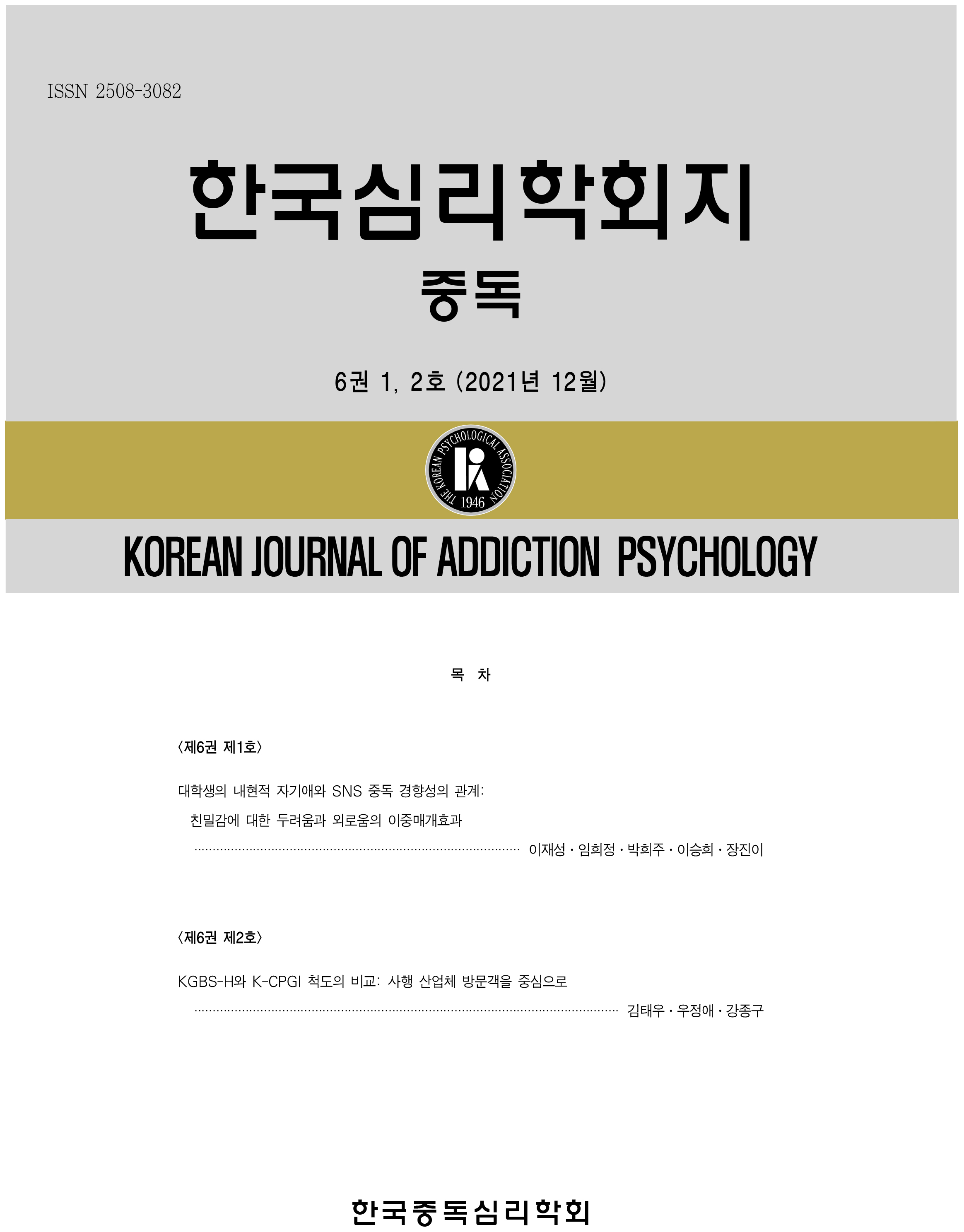- 권한신청
- P-ISSN2508-3082
4권 1호
초록
본 연구는 스마트미디어를 과다사용하는 기혼여성의 결혼 전·후 부부관계 및 자녀관계에서 과다사용 경험이 어떻게 재구성되고 의미를 부여하는지 심층적 이해를 위해 수행되었다. 연구 참여자는 스마트미디어를 과다사용하는 만 3-5세 유아기 자녀를 둔 결혼 10년차 이내 20-30대 기혼여성 3명을 선정하였다. 연구퍼즐은 결혼 전 삶의 경험이 스마트미디어를 과다사용하는 결혼 후 경험 이야기를 어떻게 형성하고, 결혼 후 어떠한 부부관계와 자녀관계 이야기를 살아내는가 이다. 자료 분석은 Clandinin과 Connelly(2000)가 제안한 내러티브 탐구절차와 시간적, 사회적, 장소의 3차원적 내러티브 탐구지점에 위치하여 작성하였다. 이를 통해 찾아낸 함의는 첫째, 스마트미디어는 감정을 자유롭게 표현할 수 없는 환경에서 만난 감정의 피난처였다. 둘째, 스마트미디어는 결혼에 대한 비합리적 바람이나 기대가 좌절되었을 때 좌절감을 수용해주는 항아리였다. 셋째, 스마트미디어는 좋은 엄마가 되어주지 못해 생긴 자녀의 결핍감을 보상해주는 통로였다. 이러한 결과를 토대로 스마트미디어를 과다사용하는 기혼 여성의 삶의 경험과 의의를 논의하였고, 후속연구를 위한 제언을 하였다.
Abstract
The purpose of this study is to deeply understand how married women who use smart media excessively reconfigure and over - use experiences in marriage relationship and child relationship before and after marriage. The researchers selected 3 married women aged 20-30 within 10 years of marriage with infant children aged 3-5 years who overuse smart media. The research puzzle is how the experience of life before marriage forms an experience story after marriage using excessive use of smart media, and what marital relationship and child relationship story after marriage are alive. Data analysis was conducted by Clandinin and Connelly (2000) on the narrative inquiry procedure and the three - dimensional narrative search point of time, social, and place. Firstly, smart media was a refuge of emotions that we met in an environment where we can not express feelings freely. Second, smart media was a jar that accepted frustration when the irrational desire for marriage or expectation was frustrated. Third, smart media was a way to compensate for the lack of children who could not be a good mother. Based on these results, we discussed the experiences and meaning of life of married women who overuse smart media, and made suggestions for follow - up study.
초록
재난관련 외상적 스트레스는 음주량 증가나 알코올 남용/의존과 관련이 있다. 또한 이런 알코올 남용은 PTSD와 우울증 그리고 그 외 다른 심리장애와 동반하는 경우가 많다. 따라서 본 연구는 국립재난안전연구원에서 수행한 "재난피해자 안심서비스 구축" 연구의 데이터를 이용하여 음주 여부와 음주량 증가가 재난피해자 집단과 대조군이 차이를 보이는지 그리고 음주량 증가와 심리장애 취약성 간에 서로 연관성이 있는지 살펴보았다. 이와 더불어 재난피해자들의 음주량 증가에 기여하는 위험요인과 이를 완화시킬 수 있는 보호요인은 무엇인지를 살펴보았다. 그 결과 현재 술을 마시는 사람 수는 재난피해자 집단보다 대조군이 더 많았다. 하지만 음주량이 증가한 비율은 재난피해자들이 대조군에 비해 약 4배 더 높았다. 또한 대조군의 음주량 증가는 우울증과 관련이 없는 반면, 재난피해자들의 음주량이 증가는 PTSD, 우울증, 알코올 남용/의존과 관련이 있었다. 이들 결과는 재난피해자들의 음주량 증가는 심리장애와 관련이 있다는 것을 나타낸다. 음주량 증가에 기여하는 위험요인과 이에 대한 보호요인은 각각 갈등 경험과 회복탄력성인 것으로 나타났다. 이들 결과는 재난과 관련된 갈등 발생을 감소시키고 심리적 탄력성 스킬을 증대시키는 중재가 중장기적으로 알코올 남용을 감소시키는데 상당한 이점을 가질 수 있을 것이다.
Abstract
Post-traumatic stress associated with disasters is a potential risk factor for increased alcohol concumption or alcohol abuse/dependence. Moreover, alcohol misuse is often comorbid with PTSD, depression, and other psychological disorders. Thus, this study examined whether alcohol use and increased alcohol consumption among disaster victims differ from control group and whether increased alcohol consumption is associated with psychological disorders using "Establishment of Disaster victim relief services" research data performed by the National Disaster Management Research Institute(NDMI). Moreover, it was also examined risk and protective factors for greater alcohol consumption among disaster victims. The result revealed that the rate of current alcohol use was higher in control group than in disaster victims. However, the rate of increased alcohol consumption was 4 times higher in disaster victims than controls. Moreover, increased alcohol consumption in control group was not related to depression, whereas it was associated with PTSD, depression, and alcohol abuse/dependence among disaster victims. Risk and protective factors that contribute to greater alcohol consumption were disaster-related conflicts and psychological resilience, respectively. The results suggest that early intervention following disasters that reduces disaster-related conflicts and increases psychological resilience skills may have substantial benefit in reducing alcohol misuse in the medium to long term.
초록
본 연구는 2019년 5월 25일 스위스 제네바에서 열린 세계보건기구(World Health Organization)의 제 72차 총회 위원회에서 국제 질병 분류(International Classification of Diseases)의 개정판인 ICD-11에 정식으로 등재된 게임 이용 장애(gaming Disorder)와 관련한 여러 사안들을 고찰해보았다. 우선 ICD-11에 게임 이용 장애가 등재되기까지의 주요 사건 및 배경들에 대해 살펴 보았고, 게임 이용 장애의 질병 코드화가 가지는 한계점에 대해 정의 및 용어와 진단 기준, 지속성과 유병률 측면에서 살펴보았다. 또한, 질병 코드화의 결과로 예상되는 혼란에 대해 과잉진단과 낙인효과, 치료 체계 측면에서 고찰해보았다. 끝으로, 심리사회적 관점에서 후속 연구의 방향 및 대응 방안에 대해 논하였다.
Abstract
This study briefly reports several issues related to the gaming disorder, which was officially included under a section of "Disorders due to Addictive Behaviors" in the 11th revision of International Classification of Diseases(ICD-11) on May 25 at the 72nd WHO assembly held in Geneva, Switzerland. First, we looked at the background and main events regarding the inclusion of gaming disorder in the ICD-11 and summarized its negative implications in terms of the definition, terminology, duration, and prevalence. Next, we went further and examined potential harms from the formalizing this disorder to our society. Finally, we provided suggestions for further research and countermeasures focused on psychosocial perspective.

